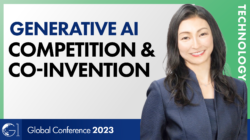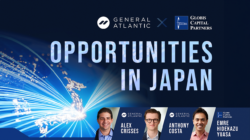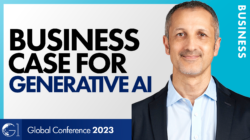Leading High Performing Remote Teams
How can leaders ensure that performance remains high in remote or hybrid-work environments?
Content Marketing
In this course, you’ll learn how compelling blogs, videos, podcasts, and other media can reach customers and drive sales. You’ll also learn steps for creating an effective content marketing plan, and some important ways to measure its impact and success.
Content marketing is a essential digital marketing strategy for companies looking to provide relevant and useful information to support your community and attract new customers.
Get started on your content marketing journey today.
Sustainable Innovation in Times of Disruption: Choices for a Better Society
There are opportunities for progress all around us. The key is to innovate on these opportunities sustainably.
To help identify most effective path forward, you'll need to gain a global perspective to these challenges in an open discussion. How can Japan and the world take action to create a more sustainable, innovative world? Where do you fit in?
It's time to find out.
Social Media & Digital Communications: Impact on Global Public Opinion
Social and digital media have dominated the communications industry for decades. But it's no secret that social media has the power to sway public opinion, and the way in which many companies use these platforms could be seen as manipulative.
What do companies need to be aware of when utilizing social and digital media? How can these mediums be used to better communicate strategically with the world?
Discover what top media and communications experts have to say.
CAGE Distance Framework
Want to expand overseas? The CAGE distance framework can help ensure you're constructing a solid global strategy in four areas: cultural, administrative, economic, and geographic. Learn how to leverage useful differences between countries, identify potential obstacles, and achieve global business success.
Servant Leadership
There's more to leadership than driving a team to profit. In fact, there's a word for looking beyond self-interest to prioritize individual growth: servant leadership. Try this course for a quick breakdown of what that is, how it works, and how it can lead to organizational success.
Strategy: Creating Value Inside Your Company
Have you ever wondered why certain companies are more successful than others? The answer is strategy: internal processes that control costs, allocate resources, and create value. This course from GLOBIS Unlimited can give you the tools you need for that strategic edge.
Strategy: Understanding the External Environment
To plan strategy on any level, you need to understand your company's external environment. In fact, your level of understanding can impact hiring, budgeting, marketing, or nearly any other part of the business world. Want to learn how to do all that? This course from GLOBIS Unlimited is the perfect first step!
Using Japanese Values to Thrive in Global Business
Japanese companies have unique cultural, communication, and operational challenges. But they also have values that have led to remarkable longevity. Check out this seminar to hear how these values help earn trust from overseas head offices and develop employees.
Marketing: Reaching Your Target
Every company works hard to get its products into the hands of customers. Are you doing everything you can to compete? In this course, you’ll find a winning formula to turn a product idea into real sales. Follow along through the fundamentals of the marketing mix and see how companies successfully bring products to market.
Basic Accounting: Financial Analysis
Want to compare your performance vs. a competitor? Or evaluate a potential vendor? Then you'll need to conduct a financial analysis. This course will teach you how to use three financial statements and evaluate financial performance in terms of profitability, efficiency, soundness, growth, and overall strength.
Career Anchors
What drives you to be good at your job?
Career anchors are based on your values, desires, motivations, and abilities. They are the immovable parts of your professional self-image that guide you throughout your career journey.
Try this short GLOBIS Unlimited course to identify which of the eight career anchors is yours!
Leadership with Passion through Kokorozashi
The key ingredient to success? Passion.
Finding your kokorozashi will unify your passions and skills to create positive change in society. This GLOBIS Unlimited course will help you develop the values and lifelong goals you need to become a strong, passion-driven leader.
COVID-19 has changed a lot of our world, including the way corporations invest in sustainability. In Japan, the trend to step up under times of crisis is a long-standing trend. But is it necessary to always wait for a crisis before finding a deeper purpose to business?
Only a few months into the start of the pandemic, the 2020 G1 Global Conference brought together leading researchers, business leaders, and sustainability experts from all around the globe to discuss this very question.
Speakers:
Robert Alan Feldman, Senior Advisor, Morgan Stanley MUFG Securities, Co., Ltd. and Professor, Tokyo University of Science
Seiji Inagaki, President, Dai-ichi Life Holdings, Inc.
Miki Tsusaka, Managing Director & Senior Partner, Boston Consulting Group
Filmed during the G1 Global Conference (October 11, 2020)
Next Article
Want to Have an Impact? Try Social Impact Investing
How Promoting the Invisible Heart Will Bring the Investment Impact Revolution
The Golden Rules for Pitching Sustainability to Angel Investors
Transcript
What It Takes for a Corporation to Reconsider Sustainability Investments
Miki Tsusaka:
With all of what’s going on, can companies, should companies continue to invest in causes that are around SDGs (sustainable development goals), or is now, you know, not the time? Do they need to pull back?
I work with a company called Boston Consulting Group, and our research says—we’ve been doing investor pulse surveys every month since the crisis—51% of investors say they will continue, which means 49% are feeling a little bit of a pain.
How Japanese Corporations Invest in Sustainability under Pressure
Dr. Robert Alan Feldman:
I think my sense of Japanese companies is that, in fact, they’re probably accelerating. Not only because it’s the right thing to do, but in this business environment, the role of business is actually to help solve social problems. We have problems with the environment. We have problems with aging. We have problems with the medical system. The role of business is to address these problems. And so if SDGs or ESG itself is the issue that society faces, the role of business is to come up with ways to solve those issues most effectively, most efficiently. And once we do that, that’s good business.
So my sense is that Japan is actually accelerating on that.
Another one is the importance of the climate issue. This is an issue that all of us face. It’s in our faces right now: too many typhoons, too many floods. This is also a huge opportunity for Japanese business. If we can move forward on the deregulation in the power business, in the energy business, there’s so much wonderful new technology now. Companies can implement that technology, make a lot of money, and help save the world at the same time. It’s a sanpo yoshi, I think is the Japanese phrase for it—”good for society, good for yourself, good for your workers.” I think that’s actually quite important. And I think Japanese companies are accelerating on this.
COVID-19: An Accelerant to ESG Investment?
Miki Tsusaka:
“Covid is an accelerant to ESG investments.” Inagaki-san, what is your view?
Seiji Inagaki:
I completely agree [with] you, what you have said. So Japanese companies are, well, resilient in times of crisis. What happened at the Tohoku earthquake and tsunami—a lot of companies invested in their communities, rather than the bottom-line profits. And I think that that’s the good part of Japanese companies.
But they don’t get serious until crisis hits. So that is a problem of Japanese companies (and my company also the same, I have to admit).
Under these times of crisis, we start to realize what we are here for. And so [with] life insurance, we internally discussed that our biggest stakeholders are the beneficiaries of death protection. So the next generation is our biggest stakeholder. But we don’t really realize that because, you know, we receive premium from the current policy holders. They are the payers, but not the beneficiaries. As an institutional investor, we have to maintain our investment returns. But at the same time, we have to secure the society for the next generation. So we got serious investing in those social impact investments and those climate-related initiatives.





